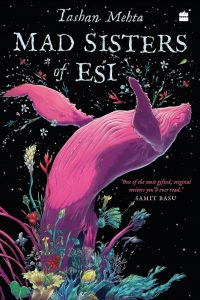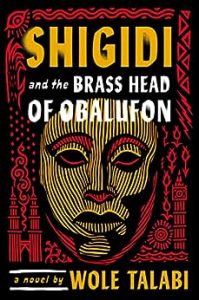The Year in Review 2023 by Archita Mittra
 Once upon a time, bad things happened and eventually, things got better. While this might be true for certain stories, real life, plagued by ongoing pandemics and genocides, rarely offers such neat conclusions. Perhaps that is why we repeatedly turn to art – not only to find escape and solace, but also, wisdom, empathy, and more urgently so, the will to resist and survive, despite the odds. And as the year draws to a close, I look through my messy spreadsheets, notebook entries, and Goodreads challenges (110 books so far, so not that bad a year), trying to make a list of titles that have stayed with me, I’m confronted again with questions about art and more specifically, what speculative fiction can do as we hurtle towards an increasingly dystopian future driven by AI and algorithms.
Once upon a time, bad things happened and eventually, things got better. While this might be true for certain stories, real life, plagued by ongoing pandemics and genocides, rarely offers such neat conclusions. Perhaps that is why we repeatedly turn to art – not only to find escape and solace, but also, wisdom, empathy, and more urgently so, the will to resist and survive, despite the odds. And as the year draws to a close, I look through my messy spreadsheets, notebook entries, and Goodreads challenges (110 books so far, so not that bad a year), trying to make a list of titles that have stayed with me, I’m confronted again with questions about art and more specifically, what speculative fiction can do as we hurtle towards an increasingly dystopian future driven by AI and algorithms.
An easy contender for a book that optimistically grapples with such a future and is one of my favorite reads of this year is Samit Basu’s The Jinn-Bot of Shantiport, which narrates a timeless story of resistance reshaping reality – and the memorable characters who risk their lives to make it so. It starts off as a cyberpunk Aladdin retelling with Lina, a young activist determined to rid the decaying city of Shantiport of its corrupt rulers and a wish-granting jinn-bot (only three wishes since it’s a trial version), but quickly morphs into something utterly unique and unconventional as Lina’s monkey-bot brother, Bador, strives for bot-rights, fights mechas in local tournaments, and slowly falls in love with Moku, a story-bot and the narrator of this tale. Like Basu’s other works, this novel is also packed with action, hilarity, and a critique of hegemonic power structures, but what took the cake (at least for me), was the slow and subtle romance that blossoms between Bador and Moku, bristling with lovely, queer-platonic undertones. It’s the perfect sort of quiet love story I long for (if the jinn-bot was real, I’d already wish for a sequel!) but so few books can actually manage to get it right.
 Another highlight among this year’s releases was Mad Sisters of Esi by Tashan Mehta, which explores the bonds of sisterhood and the grief of separation in a wildly imaginative and structurally inventive style. From the tale of the two sisters, Myung and Laleh, who dwell contently inside a many-chambered mythic whale until one of them has the desire to leave while the other wishes to stay there forever, to the playful descriptions of flora and fauna in the novel’s sentient islands, and the many curious artefacts (which include diary entries, fairytales, whimsy academic papers, nested stories and a ‘‘Museum of Memory’’) that add another dimension to the narrative, every page of Mad Sisters of Esi is suffused with a sense of wistful wonder and strangeness, and is wholly unlike anything I’ve read before, and I can’t recommend it enough, not only to fans of fantasy but for anyone keen on a sublime reading experience.
Another highlight among this year’s releases was Mad Sisters of Esi by Tashan Mehta, which explores the bonds of sisterhood and the grief of separation in a wildly imaginative and structurally inventive style. From the tale of the two sisters, Myung and Laleh, who dwell contently inside a many-chambered mythic whale until one of them has the desire to leave while the other wishes to stay there forever, to the playful descriptions of flora and fauna in the novel’s sentient islands, and the many curious artefacts (which include diary entries, fairytales, whimsy academic papers, nested stories and a ‘‘Museum of Memory’’) that add another dimension to the narrative, every page of Mad Sisters of Esi is suffused with a sense of wistful wonder and strangeness, and is wholly unlike anything I’ve read before, and I can’t recommend it enough, not only to fans of fantasy but for anyone keen on a sublime reading experience.
Speaking of the sublime, Indra Das’s exquisite novella, The Last Dragoners of Bowbazar, set in my hometown of Calcutta, effortlessly weaves magic and myth into the mundane, in a heartbreakingly beautiful tale about belonging, memory, identity, queerness, and of course, dragons. It narrates the story of Ru, a ‘‘boy from nowhere,’’ whose parents are migrants from another realm and whose recollections of his childhood and teenage years, which include reading/watching The Lord of the Rings, playing video games, and friendship with Alice, a neighboring girl from Chinatown, are also interspersed with the magical memories of riding dragons across the city skies, raising young drakes in aquariums, sharing a magnificent meal of dragonflesh with his classmates and arcane histories of a secret nomadic community that, like so many minority groups, are slowly fading away. There’s so much I adored about this spellbinding little book – the picturesque descriptions and the poetic prose, infused with so many serpentine metaphors, the subtle ways Ru and his family express their gender fluidity, and of course, the bittersweet ending, which, despite wrestling with an immeasurable sense of loss and loneliness, still glimmers with a sliver of hope and magic. Though it’s an unforgivably short read, Ru’s story and my anxieties about his future continue to linger in my mind in a curious sort of afterlife, blending with my own melancholy – a poignant reminder of the power of art to memorialize, transmute, and even resurrect the things that we thought we’d lost.
2023 also marks my first year of reviewing for Locus – an incredible, dream-come-true experience, and one of the few bright spots in an otherwise tumultuous, grief-torn period. For the vast majority who still mourn their dead, care for their sick, and long for a past that seems as far away as a memory of another life, the pandemic was a harbinger of a slow and insidious apocalypse. Though if I had to search for a silver lining, it’s that in the long, lonely weeks and months following the lockdowns, I rediscovered my love for reading, across genres and forms – not just to cope with reality, but to imagine better and happier ways of being. In that regard, I enjoyed the eclectic variety of books I’d been assigned to review for various outlets, most of which I wouldn’t be able to read otherwise (due to factors such as publishing/distribution rights, supply chain issues, and the inequalities faced when residing in the global south, so my heartfelt gratitude to all the lovely people in the SFF community who made me feel at home). Many of these books brought back the sheer escapist, optimistic delight of voraciously devouring fantasy novels as a teenager, and made me excited for the experimental and literary turns that commercial genre fiction seems to have taken.
 Some of these include Zhara: Guardians of Dawn by S. Jae-Jones, a light-hearted Cinderella retelling in an East Asian-inspired setting that manages to be stunning and silly at the same time; Wole Talabi’s debut novel, Shigidi and the Brass Head of Obalufon, a fun neonoir supernatural thriller where a succubus and a minor nightmare god from the Yoruba pantheon team up for a heist at the British Museum with Aleister Crowley as their getaway driver; and Dreambound by Dan Frey, an unputdownable urban fantasy novel about a father’s quest to find his missing daughter, which deliciously delves into Fae machinations, franchises inspired by best-selling fictional series and fandom cultures, told entirely and very convincingly through found documents (such as emails, journal notes, text messages, novel excerpts, fanfics and even at one point, a police report).
Some of these include Zhara: Guardians of Dawn by S. Jae-Jones, a light-hearted Cinderella retelling in an East Asian-inspired setting that manages to be stunning and silly at the same time; Wole Talabi’s debut novel, Shigidi and the Brass Head of Obalufon, a fun neonoir supernatural thriller where a succubus and a minor nightmare god from the Yoruba pantheon team up for a heist at the British Museum with Aleister Crowley as their getaway driver; and Dreambound by Dan Frey, an unputdownable urban fantasy novel about a father’s quest to find his missing daughter, which deliciously delves into Fae machinations, franchises inspired by best-selling fictional series and fandom cultures, told entirely and very convincingly through found documents (such as emails, journal notes, text messages, novel excerpts, fanfics and even at one point, a police report).
As I write this, I’m also painfully aware that I’m just scratching the surface. There are plenty of brilliant SFF titles (not to mention short fiction and speculative poetry) published this year that I haven’t yet got to – but definitely will, perhaps in the few remaining weeks up to Christmas or in the next year. I suppose having a near-infinite TBR list is an essential aspect of a bookworm’s life which ensures that no matter what the future brings (although happily-ever-afters that aren’t AI generated are much appreciated), there’s always new art to look forward to.
Archita Mittra is a writer and artist, with a fondness for dark and fantastical things She completed her B.A (2018) and M.A (2020) in English Literature from Jadavpur University and a Diploma in Multimedia and Animation from St. Xavier’s College.
When she isn’t writing speculative fiction or drawing fanart, she can be found playing indie games, making jewelry out of recycled material, reading a dark fantasy novel, baking cakes, or deciding which new Tarot deck to buy.
She lives in Kolkata, India, with her family and rabbits.
This review and more like it in the February 2024 issue of Locus.
 While you are here, please take a moment to support Locus with a one-time or recurring donation. We rely on reader donations to keep the magazine and site going, and would like to keep the site paywall free, but WE NEED YOUR FINANCIAL SUPPORT to continue quality coverage of the science fiction and fantasy field.
While you are here, please take a moment to support Locus with a one-time or recurring donation. We rely on reader donations to keep the magazine and site going, and would like to keep the site paywall free, but WE NEED YOUR FINANCIAL SUPPORT to continue quality coverage of the science fiction and fantasy field.
©Locus Magazine. Copyrighted material may not be republished without permission of LSFF.







